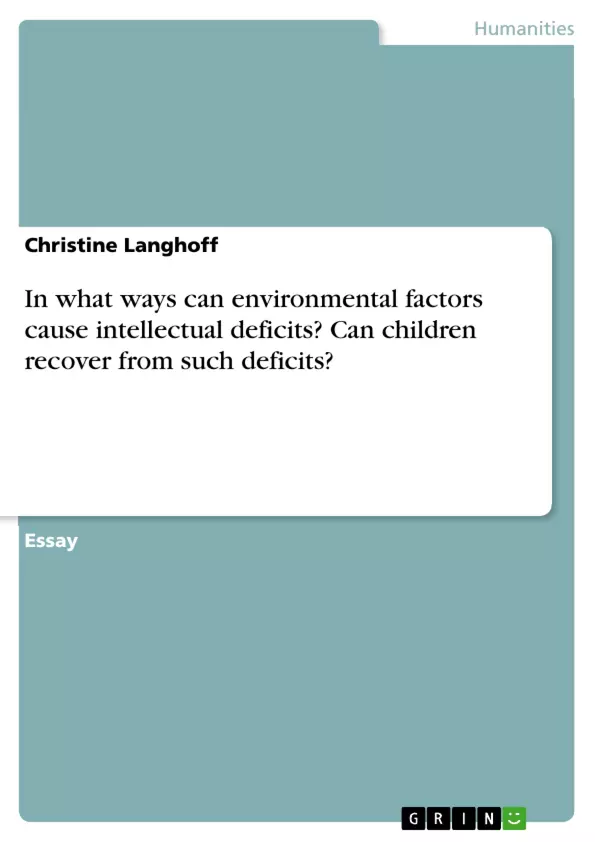Many researchers have tried to identify environmental factors that can cause intellectual deficits. These include malnutrition, deprivation of parental care, abuse, prenatal drug exposure or exposure to stress hormones, parental style and so on. It is important to identify such potential factors in order to consider the risk of intellectual deficits. Further one has to investigate how these early developmental influences are connected with the outcome in maturity. It has been suggested by some researchers that certain kinds of early experiences produce irreversible effects. I am going to explore some of the environmental factors that can cause intellectual deficits. Further I am going to investigate whether children can recover from such deficits.
Inhaltsverzeichnis (Table of Contents)
- Nutrition
- Effects of Malnutrition
- Reversible Effects of Malnutrition
- Impact of Food Supplementation
- Animal-Source Food
- Deprivation
- Severe Deprivation
- Substitute Care
- Chronic Adversity
- Extreme Deprivation of Parental Care
- Resilience and Vulnerability
Zielsetzung und Themenschwerpunkte (Objectives and Key Themes)
This work explores the relationship between environmental factors and intellectual deficits in children. It aims to investigate specific environmental factors that can contribute to intellectual deficits and assess whether these deficits are reversible. The primary focus is on the impact of nutrition, deprivation, and chronic adversity on intellectual development.
- The impact of nutrition on intellectual development, including the effects of malnutrition and food supplementation.
- The influence of deprivation on intellectual deficits, particularly in cases of severe deprivation and substitute care.
- The role of chronic adversity in intellectual development, including the potential for reversing negative effects.
- The importance of resilience and vulnerability in determining individual responses to adverse experiences.
- The complex interplay between environmental factors, individual characteristics, and long-term outcomes.
Zusammenfassung der Kapitel (Chapter Summaries)
The text explores the effects of different environmental factors on intellectual development, focusing on nutrition, deprivation, and chronic adversity. It examines the potential for reversing these negative effects through improved diets, supportive environments, and interventions.
- Nutrition: This section examines the link between malnutrition and intellectual deficits, highlighting the difficulty in isolating the effects of nutrition due to its association with other factors. The text discusses the potential for reversing the effects of severe malnutrition through improved nutrition and care, but acknowledges that long-term severe malnutrition can have lasting effects.
- Deprivation: This section focuses on the effects of severe deprivation, particularly in cases of institutionalized care. The text analyzes the potential for cognitive impairment and behavioral issues associated with deprivation and examines the differences in outcomes between children in institutionalized and foster care settings.
- Chronic Adversity: This section explores the impact of chronic adversity, drawing on examples of children exposed to prolonged deprivation and highlighting the potential for reversing these effects through drastic changes in rearing conditions. It illustrates this point with a case study of children raised in a Middle Eastern orphanage.
Schlüsselwörter (Keywords)
This work explores the key concepts of intellectual deficits, environmental factors, nutrition, deprivation, chronic adversity, resilience, vulnerability, and long-term outcomes in children. It investigates the impact of these factors on cognitive development and examines the potential for reversing negative effects through interventions and supportive environments.
Frequently Asked Questions
Can environmental factors cause intellectual deficits in children?
Yes, research identifies factors such as malnutrition, severe deprivation of parental care, chronic adversity, and exposure to stress hormones as significant causes of intellectual deficits.
Is it possible for children to recover from intellectual deficits caused by malnutrition?
Recovery is possible through improved diets and supportive environments, although long-term severe malnutrition during early development can sometimes lead to lasting effects.
What are the effects of severe deprivation on cognitive development?
Severe deprivation, often seen in institutionalized settings, can lead to significant cognitive impairment and behavioral issues, but interventions like foster care can show improvement.
How does chronic adversity impact intellectual growth?
Prolonged exposure to negative environments can stunt intellectual growth, but studies of children in orphanages show that drastic positive changes in rearing conditions can lead to recovery.
What roles do resilience and vulnerability play in these deficits?
Resilience and vulnerability determine how individual children respond to adverse experiences; some may recover more quickly or fully than others depending on their personal characteristics and the quality of intervention.
- Quote paper
- BA (Oxon), Dip Psych (Open) Christine Langhoff (Author), 2004, In what ways can environmental factors cause intellectual deficits? Can children recover from such deficits?, Munich, GRIN Verlag, https://www.hausarbeiten.de/document/80248


